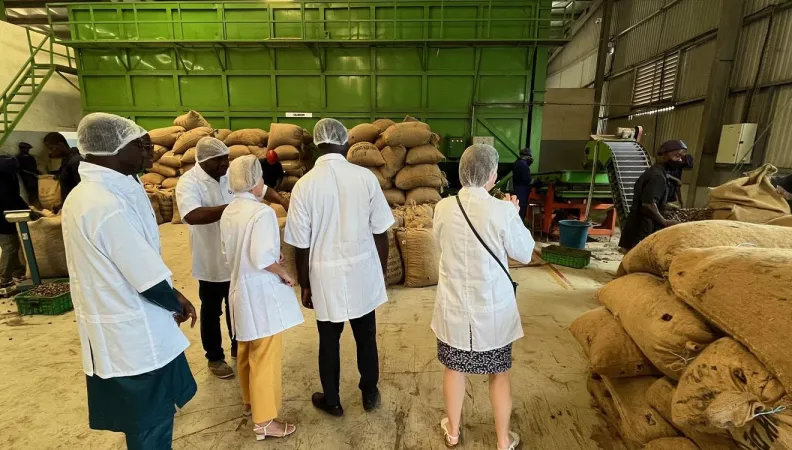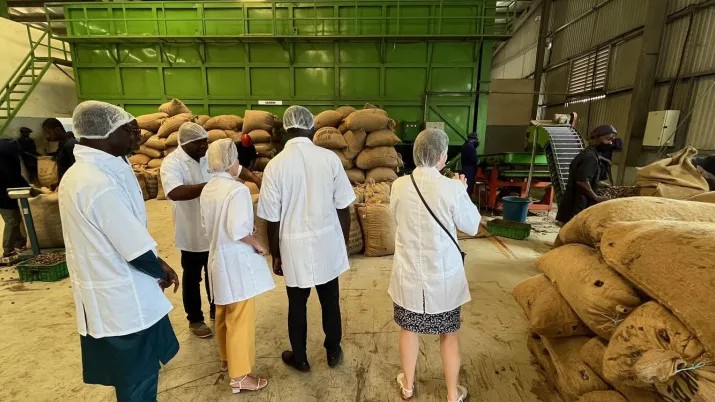Share the page
The IDBio Project: transforming biosourced wastes for more sustainable industries
Published on

The IDBio project, supported by the Academia Partnerships Africa-France Program (PeA), responds to a growing challenge in Africa: the development of renewable resources and sustainable waste management. In this article, IDBio project coordinator Dr. Joseph Bassama talks about how the project rises to meet this challenge and IDBio’s inter-university dimension and added value.
Gaston Berger University in Senegal and INSA Toulouse in France initiated IDBio to develop a specialized education program spanning bachelor to PhD levels as well as ambitious applied research activities. The program includes training in three fields: agricultural residue processing, production of biopesticides and biofertilizers from organic waste, and biomaterial design. The resulting innovations are used in key sectors such as energy, food, environment, and construction.
Why are skills for promoting renewable resources and waste recovery critical for Senegal?
These skills can help tackle the challenges facing Senegal’s agricultural and agri-food sectors, which not only need to find sustainable development solutions and combat the effects of climate change, but also create wealth and jobs. The objective of the IDBio project is to train students who can design more sustainable food systems that are environmentally responsible, economically viable, socially equitable, and resilient to crises. This basically means developing technical innovations that help transform the local economy. Moreover, the proposed training programs are fully aligned with Senegal’s transformation strategy, Vision 2050.
Beyond the partnership between Gaston Berger University and INSA Toulouse, IDBio has, from the outset, focused its approach on synergies and exchanges extending to other African and French universities. What was behind this choice?
IDBio started as a non-funded UNESCO Chair supported by a consortium of seven French engineering schools and research centers and six universities in West Africa and Madagascar. Its goal is to promote North-South and South-South exchanges through skills transfers, co-development of research topics, and the joint supervision of theses. The launch of the PeA IDBio project has bolstered this dynamic by providing key financial support, and it has opened the way for a broader training approach starting at the bachelor’s degree level.
Read also: Africa-France academic partnerships focus on gender equality and employability
In concrete terms, what does this consortium bring to teacher-researchers?
Nine theses are funded by the PeA: the subjects are co-developed by three partners (one French and two African), and the PhD students spend one year with each partner. This educational mobility offers them an exceptional scientific, cultural, and institutional immersion that fosters real interdisciplinarity and an enriching intercultural experience. To further strengthen the capacities of the PhD students and the engineers, nine theoretical training sessions are held in Africa and three practical training sessions in France.
And how will this approach be adapted to the bachelor’s and master’s programs that you are setting up?
First, IDBio is shoring up the training already dispensed in the African institutions. It is training local teachers through the project’s theoretical and practical sessions and makes educational digital resources available to students. To encourage exchanges, the project is also experimenting with systems that allow for practical distance learning via technical platforms set up in Toulouse. A subregional master’s program will also be launched at Gaston Berger University. It will include a third semester at one of the partner universities, together with an agreement to ensure the co-validation of credits. The overall approach aims at structuring a high-level training path rooted in local needs but open to international dynamics.
Read also: The first seminar of the academia partnerships Africa-France (PeA) program: a unique collaboration
You mentioned the UNESCO Chair label. What advantages does it offer for finding support beyond the Academia Partnerships Africa-France program?
The UNESCO Chair label is important, as it affords international recognition of the consortium’s scientific excellence, the relevance of its vision and the value of its action vis-à-vis the various academic partners and local actors. The label acts as a strategic lever to ensure the sustainability of its activities. In tandem, the creation of the Avenir-Afrique foundation within the IDBio framework will make it easier to mobilize additional funding to support our long-term actions.
Further reading
Cape Town and AFD: an exemplary partnership for sustainable coastal resilience
Published on june 6 2025

The IDBio Project: transforming biosourced wastes for more sustainable industries
Published on june 3 2025


